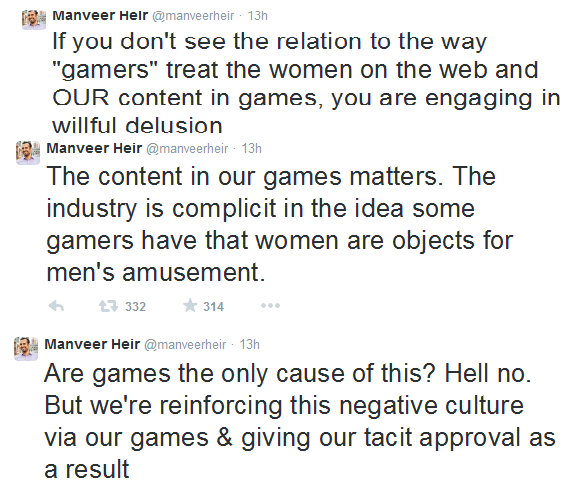Since Jason is posting in here:
I want to link to
this Slate article which I feel is a pretty good summary AND opinion piece.
Jason, I'd like your opinion on:
Now, while technically the article he links
doesn't have "underage toothbrush incest" (unless that's what the anime is about but I don't see that in the article) I do have to agree with him in regards to the signal-noise for gaming "blogs" being too high on PR/unrelated stuff to where finding the actual useful stuff (like your articles on Crytek) is kinda hard to find or follow.
I'm curious your thoughts in regard to the signal-noise aspects of "games journalism" outside of "GamersGate," if you have any. I'd also like your opinion as a "games journalist" "combating" the new wave of Youtube "LetsPlays" showing games off than regurgitating PR press-releases as "previews." How is Kotaku/et. al. doing in regards to fighting that?
Part of the problem is the "signal," deep investigative pieces, take a long time to research and put together. You can't sustain a website on those pieces.
For example, here's the front page of the Washington Post:
Like most online news sites, it's a mix of original long content, investigative journalism, regurgitated news, opinion-editorials, videos, and even list articles. Not that much different from something like Kotaku or Polygon.
Here's the New York Times:
And CNN:
Read all the headlines. They run the full gamut from serious stories and fluff. Primarily because people like to read the fluff too.
On the LetsPlays side, there's nothing to combat really. You're seeing many outlets doing their own form of that content, like GameSpot's extensive streaming of P.T. What's there to fear when you can do it yourself? Especially since some YouTubers operate without any ethical codes. It's a relatively young medium.
The media in any sector, regardless of what everyone thinks, has always been a complete reflection of what audiences read and consume.
Is there a relationship between journalists and those they cover? Of course, that's how great journalism works. For example,
VICE's amazing Islamic State work, where did that come from?
VICE News reporter Medyan Dairieh spent three weeks embedded with the Islamic State, gaining unprecedented access to the group in Iraq and Syria as the first and only journalist to document its inner workings.
That doesn't happen because they see "journalist" and say "okay". That happens because journalists
make connections and relationships in search of the story.
Sutcliffe approached Dairieh, who previously made Vice documentaries about the battle for Aleppo and how British citizens are fighting with jihadists in Syria. Using his extensive contacts in the region, Dairieh managed to secure access to the Islamic State-controlled area of Syria, which has been mired for years in a devastating civil war.
Not surprisingly, Dairieh couldn’t travel as he pleased during the roughly 10 days he spent in Syria last month. And gun-toting Islamic militants were always nearby. Despite these restrictions, Sutcliffe insisted Vice was still able to tell a compelling story.
“We’re showing you what’s going on there,” Sutcliffe said, adding that Dairieh was able to ask good questions throughout. “There’s been a lot of stuff about the frontline activity, but to try and understand what a very hardline, conservative Islamic state would feel like, that’s what I thought was more interesting.”
And the vantage point was unique. "At the moment, we think he’s the only person they’ve let in for this amount of time," Sutcliffe said.
Watergate? The story many hold up as great journalism? It's because of friendship and connections.
Woodward had befriended Felt years earlier, and had consulted with him on stories before the Watergate scandal. Woodward, Bernstein, and others credit the information provided by Deep Throat with being instrumental in ensuring the success of the investigation into the Watergate Scandal.
That's how journalism works. Are there lines? Of course, which is why code of ethics are needed, but journalism is predicated on access, which requires either outright theft or an inside source.
Most things reported on in our industry aren't life or death. In fact, you normally hear about big stories like that when the inside sources have little to lose, like the Crytek story or Team Bondi's fall. When everyone's happy and getting paid, there's no need to whistleblow, but when your company hasn't paid you for a month or more, then of course you'll talk about everything that's going wrong. (Anonymously, because you still need to find another job.)
Real journalism is predicated on relationships providing access.
I admit that I probably gave a bit more than what you expected when you asked Jason.






